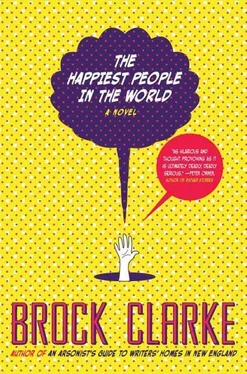“They’re not killing each other,” Lawrence said. “It’s one group killing another.”
“Yeah, Dad,” Kurt said. “That’s what makes it a massacre .”
But Matty was having none of it. “I say let them kill each other,” he said.
This then began a long argument that no one except the two main combatants much listened to. Ellen stood up, walked into the kitchen, and then returned with a full glass of white wine and the glazed, slightly detached look of someone who occupies the same room as arguing people whose arguments basically have nothing to do with her. She sat down on the couch next to Kurt and smiled at him. The smile was real. But also tired. Her eyes were bright, bright blue, as ever. But also tired. And old. Kurt could suddenly picture his mother’s death — not the manner of her death, just the fact that she would die, and way too soon. He would not be ready for it, whenever it happened. I love you, he wanted to say. Please don’t die. But Kurt hadn’t drunk enough raki to say something like that. Instead he looked back at the television screen and thought, Monday, Monday, Monday.
“If they want to kill each other in the name of Allah,” Matty was saying, “then I say let them.”
“Oh great,” Kurt said.
“Actually,” Lawrence said, “the Alawite rulers of Syria have quite a vexed relationship with radical Islam.”
“Actually, the Alawite rulers of Syria have quite a vexed relationship with radical Islam,” Matty mocked. This was the way they argued: Lawrence would try to reason with Matty, and Matty would give Lawrence every reason to abandon his reason and say, Wow, I’d really like to punch you right in the face right now. They would argue like brothers, in other words. Brothers: to Kurt, an only child, being around them could make him feel very lonely, or lucky, depending.
“Matty,” Ellen said. Because this was her role: to finally distract the arguing brothers from their argument. No wonder she looked so tired. “Tell your brother about why you fired Sheilah Crimmins.”
And then something weird happened: his father lost his grip on his martini glass and some of the booze spilled onto his lap, and then he said, “Shit,” and stood up, thus spilling the remaining booze on his shirt. “Shit, shit,” he said, looking mad and guilty, the way you do when you spill something on yourself, except even madder and guiltier than that.
“Napkin,” Lawrence said, and he handed one to his brother. Matty took it and started wiping himself with it, still muttering, not looking anyone in the eye, like he’d done something really wrong. Kurt noticed it, and so did his mother. “Matty,” she said, “what’s your problem ?”
“Nothing,” he said, and only then did he seem to recover. Matty met Ellen’s eyes and smiled, and then turned to his brother and said, “I fired Sheilah because she’s a terrible guidance counselor and also because she’s a drunk,” and then all the adults took up the subject, talking about Sheilah’s famously alcoholic ways, how they couldn’t believe it had taken Matty this long to fire her, and how much better the new guidance counselor would automatically be, asking Matty whether he had any leads on a new guidance counselor, and in fact Matty did have some leads, he hoped to have someone new start next week, but his leads were all on people from out of town, they might have to put up whomever he hired in one of the rooms above the Lumber Lodge until the new guidance counselor found a place of his own, etc. Kurt didn’t say anything during any of this. The moment his father had spilled his drink, the room had started to feel spooky, like something or someone had entered it. Kurt looked around. His family was all here. So who else was there? His English teacher, Ms. Andrews, in lieu of taking attendance, often just asked, “Is everyone here? Who is here? Who is not here?” Kurt sipped some more raki and Coke and wondered, Is everyone here? Isn’t everyone here? Who is here? Who is not here?
Two days later. The plane was in the air. They were well on their way to New York.
“If you want to ask any questions,” the agent said, “now would be the time.” Jens couldn’t believe how loudly she was talking. Apparently everyone, even secret agents, talked on airplanes as though everyone near them were deaf or in any case couldn’t possibly be interested in listening to their private conversations. Then Jens noticed how tightly she was gripping her armrests. She was nervous, he realized, although he couldn’t figure out whether it was flying that made her so nervous, or the prospect of going to New York, or something else entirely. Jens stood up slightly and acted as though he were just casually looking around the airplane. But of course he was really looking for people who might want to kill him. Three rows in front and to the right, there was a woman in a headscarf, sitting next to a dark-bearded man wearing a skullcap. The man was reading a book; the woman was tapping the video screen on the back of the seat in front of her in an irritated way. She said something to the man in German. Jens didn’t speak German, but he was fairly certain that what she was saying was not, Is that the Danish cartoonist we’ve been wanting to assassinate back in 24E? but rather, This stupid thing is broken. Why do I always get the broken one? Jens sat down again. He and the agent were sitting in the leftmost two seats of the six-seat middle row. The agent was in the aisle seat. Next to Jens were an older man and woman, Americans, who were having their own loud, oblivious conversation.
“I don’t know what this is, Carl,” the woman was saying, dangling a white packet over her cup of coffee. “But I do know what it is not.”
“Helen, you know exactly what it is,” Carl said. “It’s sugar.”
“But it’s not Splenda,” Helen said. “That’s my point.”
“Henrik Larsen?” Jens said to the agent. Because right before entering the airport, the agent had handed him his passport and ticket and said, “This is you.” The name on both was Henrik Larsen, and the passport said that he was a citizen of Sweden. “Why Henrik Larsen?”
“Because your English is too good for you to be anything but a Dane or a Swede. And I thought it would be better for you to be a Swede.”
“And why am I in America?”
“You met an American woman in Sweden. You fell in love. You married her. The two of you moved to the United States, to New York City. Then you did something stupid. She divorced you. You deserved it.” All of this should have sounded mean, and in fact might have been intended to be mean, but the agent’s voice instead sounded sweet, definitely sweet. She smiled at Jens in what seemed to him an oddly fond way. It was the way his wife had looked at him back when she thought of him as a lovable goofball, before she began to think of him as an unbearable and then dangerous-to-be-married-to goofball.
“What did I do?” Jens asked. “To make her divorce me?”
“I’m sure it won’t be too hard for you to think of something,” the agent said.
It wasn’t too hard. Jens was already thinking about it. He never stopped thinking about Skagen, the cartoon, his wife, their burning house, their marriage, his fake death. His whole life, it seemed, was a series of mistakes that anyone else in the world but him would have recognized as mistakes in advance and therefore not have made them.
Then again, he told himself, this was probably true of everybody.
But then again, he told himself, not everybody was on the run from people trying to kill him because of that mistake that nobody else would have made.
“Where is Broomeville?” Jens asked.
“It’s in the sticks,” she said loudly.
Читать дальше












